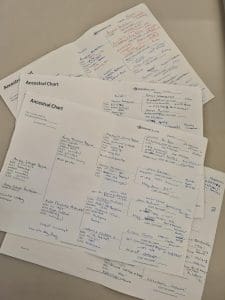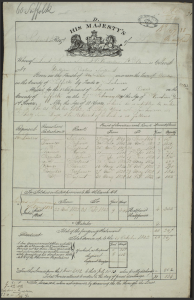I’ve been assisting people with their family history for over 20 years now. Mainly in a military museum context, but more recently I’ve joined the ranks of the Family History Librarians on Tuakiri | Identity, Level 2 in Tūranga, getting to help library users with their New Zealand and international ancestors, and becoming very familiar with our amazing resources.
A family history librarian delves into their own family history
However, I’ve never really shown an interest in my own family history. That was what my uncles did, and when I vaguely poked around in Ancestry I didn't exactly feel a connection to anything.
Recently the team have been planning some online family history programmes - the first of which is this Thursday and is about finding charts on which to record your lineage, and for some reason I wondered what it would look like if I filled one in myself. So I started investigating and this time I actually got into it, and have now got 4 scrappy bits of paper – one for each of my grandparents – and have traced back several generations. I have mainly used Ancestry and Find My Past, both of which can be used for free on library computers. Some locations have dedicated family history computers with these resources and more. It truly is amazing what you can find at the click of a button.
Paupers, labourers and a partially sighted postman
I, myself am very English. My mum’s side of the family comes from the greater Peterborough area, and my dad’s side from the Suffolk / Norfolk border, east of Norwich. The most exotic person I’ve found comes from Staffordshire. People really didn’t move around very much in the late eighteenth and nineteenth centuries (well, except for the industrial revolution).
And I’m certainly not posh – lots of agricultural labourers, the odd pauper and several generations of painters and decorators, although one side did have a farm. Oh, and one great-great-great grandfather was a partially sighted postman, which I did find quite amusing but he – and the elderly paupers – made me think about the lack of a safety net in those days and how precarious life was without pensions or benefits, and while there was poor relief this changed into the threat of the workhouse during the nineteenth century (my A-level history coming in useful there!).
William Caston, war hero?
All very ordinary, and then one day I noticed that another great-great-great grandfather (we all have 16 of them, unless you’re a Hapsburg) William Caston was down in the census as being a Chelsea Pensioner. Not one of jolly old men and women in red uniforms who live in actual Chelsea – they’re in-pensioners. He would have been an out-pensioner – someone who had served their time in the army, and was now living with their family and receiving a pension. This was intriguing, so I delved a bit further and he’s on the Waterloo Medal Roll. No way! Looked at another record – served in the Peninsular War too. Cool! Did he meet Richard Sharpe? Find My Past provided me with is service record and the details checked out. It was definitely him, he served with the cavalry – the 16th Light Dragoons - and he’d also gone on to serve in India in the 1820s. I triple checked with an uncle, and he’d found the same but hadn’t quite made the link to the army.
But why hadn’t I heard of him before? Surely the story of someone who’d been at Waterloo would have come down the generations? What I suspect happened was that as his daughter, Catherine, died soon after the birth of her daughter Kate, my grandad’s mother, the story lost opportunities to be handed down. So it feels really nice to bring his story to life again, and also those of all my ancestors, who were just doing their thing, but who all led to me. And maybe the right time to do it was now.
So, if you’re thinking of poking around in your own family history, it is a worthwhile task, and goodness knows where you’ll end up. And we have heaps of resources and staff to help you!




Add a comment to: Opening up your family history at the library